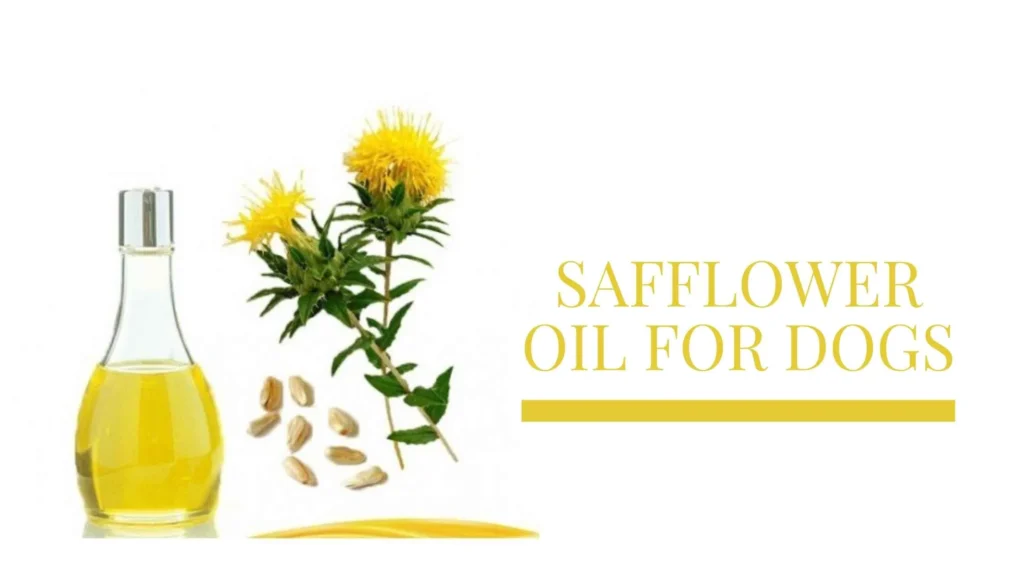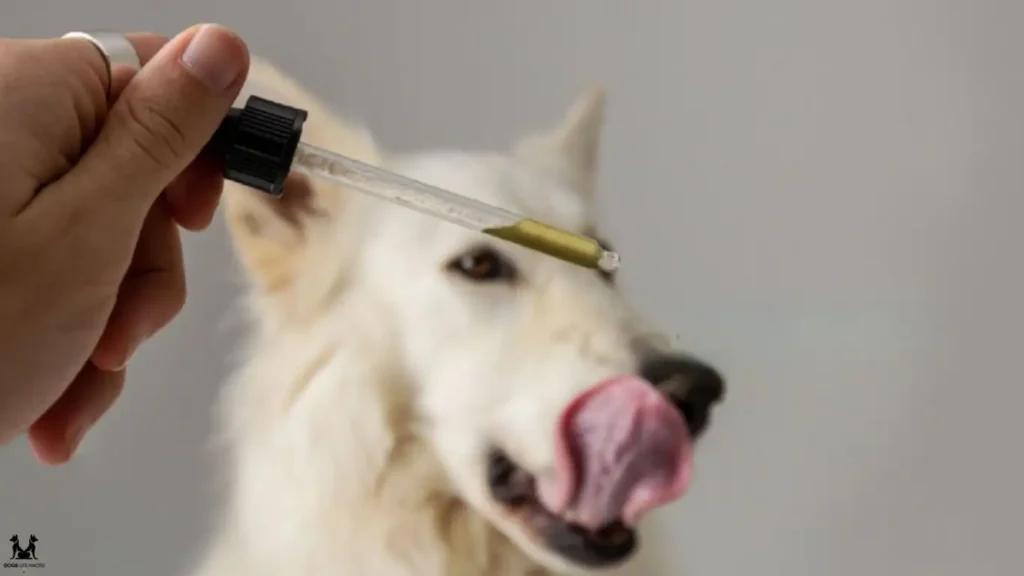Safflower Oil For Dogs – Boost & Transform Dog’s Health!

If fish oil is known to enhance dog’s health you could think about using safflower oil as an alternative or extra choice. If you aim to improve your pet’s health without medication then you are at the right spot.
Safflower oil acts as a natural aid for dogs and significantly improves their diet and well-being. In addition to promoting skin health in your pet’s overall wellness safflower oil helps with glossy coats and reduces inflammation.
You will discover the positives of safflower oil for dogs and why it is appropriate for your pet here. In quest of better skin health or an extra boost for dry skin safflower oil may fit your needs.
Benefits of Safflower Oil for Dogs
By incorporating safflower oil into their diets dogs can reap various benefits. Dog owners choose safflower oil for dogs because of its high concentration of Omega-6 fatty acids. Having a healthy coat and better skin results from these important fats.

- Improved Skin Health: Dogs with skin problems like dryness or flaking can see major improvements from the skin-soothing effects of safflower oil for dogs. Safflower oil contains Omega-6 fatty acids that replenish skin hydration decreasing dryness and itchiness.
- Shinier Coat: If your dog’s fur appears dull or brittle you can revive it with safflower oil. The fatty acids in safflower oil enhance a vibrant and sleek coat for dogs with improved health overall.
- Boosts Immune System: The immune system benefits from safflower oil for dogs. Fats that are beneficial for health control inflammation in the body to keep us well and fight infections.
- Weight Management: Safflower oil’s high-fat content may stimulate weight control efforts. For dogs that struggle with obesity, safflower oil supports a healthy metabolism to keep them at a good weight.
Safflower Oil Dosage for Dogs
Calculating the ideal usage of safflower oil for dogs is important to make sure they receive the total effect without any harmful effects. Although safflower oil is good for dogs and dogs generally tolerate it well; an excessive dose can result in upset stomach or weight gain from the high fat content. At what level should we offer safflower oil to dogs?
General Guidelines:
- Dosage for Dogs Under 20 lbs: 1/4 to 1/2 teaspoon of safflower oil per day.
- Dosage for Medium Dogs (20-50 lbs): 1/2 to 1 teaspoon per day.
- Dosage for Large Dogs (Over 50 lbs): 1 to 2 teaspoons per day.
- Precaution: Carefully observe your dog when introducing safflower oil into their diet.
Consult Your Vet: Before adding safflower oil to your dog’s diet consult your veterinarian. Based on your dog’s age and breed along with health issues your vet will give tailored suggestions.
Incorporating Safflower Oil into Meals: Adding safflower oil to your dog’s food is straightforward. Begin with a minimal quantity and then increase it gradually in line with the recommendation for dosages. Blending it with their food makes sure your dog accepts it readily.
Is Safflower Oil Safe for Dogs?
When given according to guidelines on dosage safflower oil dor dogs is often regarded as being safe for dogs. Similarly, if you misuse it you risk encountering harmful side issues. Safflower oil brings many advantages to your dog’s health. However, some precautions are necessary to guarantee safety.

- High-Fat Content: Safflower oil for dogs contains a lot of fat and is abundant in Omega-6 fatty acids. In large doses, these fats can bring about weight issues or provoke digestive troubles like diarrhea or stomach upset. Conform to the suggested dose and pay attention to how your dog interacts when you add it to their diet.
- Allergic Reactions: Even though oil is not commonly allergic in dogs you must keep an eye out for allergic symptoms like itching or swelling following its usage. If your dog presents any unusual issues while using the oil cut down on usage and visit your vet for guidance.
- Balance with Omega-3: To achieve optimal health levels one must balance Omega-6 fatty acids with the necessary Omega-3 fatty acids. An Overabundance of Omega-6 about Omega-3 might trigger inflammation. Add safflower oil to your dog’s eating plan. However, ensure they also obtain enough Omega-3 fats from sources like fish oil.
Safflower Oil for Dog Skin Health
Improving skin health is one unique feature attributed to safflower oil for dogs. Dogs experiencing dry skin can considerably improve with the nourishing qualities of this natural oil. By using safflower oil from the bottom up your pet’s skin gets nourished and calmed.

- Moisturizing Dry Skin: Almond and safflower oils for dogs are important in maintaining skin moisture because they contain linoleic acid. That’s right safflower oil will add moisture to the skin hence reforming the coin-like skin layers to become soft again and reduce cracking.
- Reducing Inflammation: The oil can also be helpful for dogs that have skin diseases such as dermatitis or other inflammatory skin disorders. Not only does it decrease redness, inflammation, and other symptoms, but also accelerates the skin’s healing process.
- Promoting the Skin Protective Barrier: The Omega-6 fatty acids in safflower oil prevent the skin’s protective barrier from aging and being damaged by environmental factors such as dust and pollen. A strong skin barrier will help minimize the risk of an infection or worsening of the skin condition.
- Combining with Topical Use: Some dog owners also apply safflower oil on their pet’s skin and coat Because of its positive effects on their health and coat, dogs are often given safflower oil. Applying two or three drops of safflower oil topically on dry or rough areas can give an instant solution and can also improve the skin’s moisture.
Omega-6 Fatty Acids in Safflower Oil for Dogs
Omega-6 fatty acids are one of the most important nutrient values of safflower oil for dogs. Certain fats are necessary for your dog, and these have a direct bearing on some of the key functions of his body such as the skin and the immune system. Knowledge about the Omega-6 fatty acid will assist you in deciding on the extent of including safflower oil in your dog’s diet.

- Vital for Skin and Coat Condition: Some Fatty acids, notably Omega-6, mainly linoleic acid, are important in the maintenance of skin and sheen coat. The deficiencies of Omega-6 in dogs cause dry skin, rough coats, and even hair loss in these animals. The details involving the consumption of safflower oil for dogs show that it contains a rich proportion of these fatty acids, which support the nutrition of your dogs’ skin and give their coat a brilliant silky appearance.
- Boosts the Performance of the Immune System: Omega-6 fatty acids act to control inflammation and enhance the functions of the immune system. For dogs facing allergies or inflammation of the skin, this is vital. Safflower oil may help diminish allergies and preserve the immune system.
- Promotes Cellular Function: Cells thrive on Omega-6 fatty acids which are paramount for growth and healing and crucial for overall health. If your dog is in the process of healing from an illness or injury adding safflower oil to their diet could boost healing.
- Balancing Omega-6 and Omega-3: It is essential to combine Omega-6 fatty acids with Omega-3 to lessen inflammation. For healthy eating habits in your dog’s diet, both Omega-6 (safflower oil) and Omega-3 (offered by fish oil) are essential.
Safflower Oil for Dogs with Dry Skin
Many dogs experience dry skin which can create discomfort and itchiness. Rainforest oil provides significant benefits for pets suffering from dry skin because of its moisturizing and healing effects. Here’s how safflower oil works to combat dryness and improve your dog’s skin condition:
- Replenishes Moisture: Rich in linoleic acid safflower oil stabilizes moisture returning hydration to your dog’s skin. Giving safflower oil to dogs with dry skin can hydrate them internally and smooth their outer layer.
- Reduces Itching and Scratching: When your pet scratches too much due to dryness in the skin it can lead to more irritation and damage. The irritation subsides with safflower oil which lowers your dog’s itchiness and promotes skin health on its own.
- Supports Healthy Skin Renewal: By boosting hydration levels safflower oil encourages skin cells to multiply. Your dog’s skin will enhance both texture and outlook as it starts to look better because of ongoing improvement.
- Preventing Future Dryness: Safflower oil’s consistent application can stop dry skin from coming back. If your dog experiences seasonal dryness or has sensitive skin adding safflower oil to their meals can sustain their skin hydration and nourishment throughout the year.
How to Use Safflower Oil for Dogs
Integrating safflower oil into a dog’s routine is easy and won’t disrupt their daily schedule. Correct usage and application methods are essential to allow the most from this essential oil.
Here’s how you can effectively introduce safflower oil into your dog’s care routine:
- Mix into Their Food: Many people introduce safflower oil to their dogs by adding it to their meal portions. Top your dog’s food with oil whether you feed it dry kibble or wet meals. Use a small dose based on your dog’s weight and add more as needed.
- Topical Application: To treat particular skin issues in dogs you can use safflower oil on the affected spots. Gently massage a small strip of oil onto your dog’s dry or inflamed patches to soothe the skin and eliminate irritation. Ensure you rub the oil evenly to stop your dog from chewing it away.
- Combined with Omega-3 Sources: Previously discussed is the significance of equalizing Omega-6 and Omega-3 fatty acids. Your dog can gain a full supply of essential fatty acids through the use of safflower oil along with fish oil or flaxseed oil. Not only will skin health benefit from this approach but so will your dog’s general well-being.
- Consider Health and Weight Variations: To start any new supplement such as safflower oil make sure you obtain guidance from your veterinarian. For the proper dosage tailored to your dog’s age and health status, your vet will assist you. Safflower oil will work well for your dog when you schedule routine check-ups.
Safflower Oil vs. Fish Oil for Dogs
| Aspect | Safflower Oil (Omega-6) | Fish Oil (Omega-3) |
|---|---|---|
| Fatty Acid Type | Omega-6 (Linoleic Acid) | Omega-3 (EPA and DHA) |
| Primary Benefits | Skin and coat health | Heart function, anti-inflammatory |
| Skin Health | Promotes hydration and sheen | Helps with inflammatory skin issues |
| Joint Health | Minimal support | Enhances joint flexibility and reduces inflammation |
| Immune System Support | Promotes skin health, localized inflammation relief | Reduces overall inflammation, supports immune response |
| Ideal Use Case | Dogs with dry skin or dull coat | Dogs with arthritis or chronic inflammation |
| Combination Use | Can be combined for holistic benefits | Can be combined to enhance skin and coat wellness |

Chart: Omega-6 vs. Omega-3 Fatty Acids
Here’s a simple bar chart to visualize the benefits of Safflower Oil and Fish Oil for Dogs:
Benefits | Safflower Oil | Fish Oil
--------------------------------------------
Skin Health | ████████████ | ██████
Joint Health | ██ | ███████████
Immune Support | ████ | █████████Natural Oils for Dog’s Coat Health
Gaining a bright coat for your dog is easier when using natural oils like safflower oil. Yet, safflower oil belongs to a group of several natural oils that aid your dog’s skin and coat condition. It differs from popular oils and might be the best option for your pet.
- Safflower Oil: Rich in Omega-6 fatty acids safflower oil is essential for supporting skin moisture and fostering a glossy coat. Both dogs with dry or flaky skin get effective results from it by retaining moisture and avoiding flaky patches.
- Coconut Oil: Many people choose coconut oil to better the health of their coats. Coconut oil contains high levels of MCTs and shows antibacterial and antifungal actions. People typically apply it for treating skin issues and reducing localized inflammation along with supporting healing. This does not have sufficient Omega-6 levels like those in safflower oil.
- Olive Oil: Your dog’s skin and coat can gain from olive oil’s rich sources of healthy fats and antioxidants. Applying this oil benefits the skin texture and coat. While olive oil is not as rich in Omega-6 as safflower oil it could prove less powerful against dry skin.
- Flaxseed Oil: Flaxseed oil provides an excellent supply of Omega-3 and Omega-6 fatty acids which supports overall skin health. Although flaxseed oil gives various perks safflower oil contains more Omega-6 and is more adept at treating brittle coats.
- Argan Oil: With its renowned nourishing properties argan oil may be applied externally to brighten the hair and regenerate frayed strands. Although it functions well on the surface it typically does not act as a dietary remedy for dogs, unlike safflower oil which boosts coat health from the inside.
Safflower Oil for Itchy Dogs
Your dog can scratch and lick their skin excessively leading to itchiness likely caused by allergies or dry skin problems. Using safflower oil as part of your dog’s care routine may ease these troubling symptoms.

Here’s how safflower oil can provide relief for itchy dogs:
- Soothes Skin Irritation: Safflower oil possesses soothing effects that can ease irritation in the skin. By easing inflammation it can ease the discomfort and reduce itching giving your dog a sense of calm.
- Hydrates and Moisturizes: Safflower oil contains a significant abundance of Omega-6 fatty acids that mindfully hydrate the skin and fight against dryness which regularly results in itching. If the skin remains hydrated your dog is unlikely to feel the need to scratch or chew at problematic spots.
- Promotes Skin Healing: Safflower oil fosters the skin’s shield and facilitates healing affected by heightened scratching or biting. Regular application can help your skin heal and nourish it to lower itchiness.
- Balancing Omega Fatty Acids: To ensure your dog gets enough fatty acids in its diet you must balance Omega-6 and Omega-3. Having this equilibrium stops excessive inflammation which might lead to an itch. Add safflower oil to Omega-3 sources like fish oil to develop a balanced diet for your dog’s skin health.
- Allergy Management: By using safflower oil regularly puppies with allergies can have a decrease in the severity of their skin reactions. By fortifying the skin’s defenses and increasing hydration rate safflower oil eases the effects of allergens and irritants that might lead to itching.
Final Thoughts
Safflower oil enhances your dog’s diet by enhancing skin health and relieving itching and dryness. Full of Omega-6 fatty acids it protects skin health and moisturizes while also promoting a shiny coat.
Using safflower oil will reduce itching and feelings of discomfort in your pet. As long as it is safe overall it is crucial to check your dog’s response and talk to your vet about correct dosages especially if health problems exist. Integrating safflower oil with fish oil can ensure an even intake of Omega fatty acids. Your dog can gain benefits from using safflower oil to thrive cheerfully and more healthily with a shiny coat and untroubled skin.
Frequently Asked Questions
What is the safest oil for dogs to eat?
Compared to saturated fat the sunflower oil is rich in Vitamin E and Omega-6. In dog food and Scratch, you will typically see sunflower oil frequently. Flaxseed oil contains Omega-3 and Omega-6. Coconut Oil dissolves quickly in the body and contains numerous beneficial saturated fats.
What is a substitute for safflower oil for dogs?
Cocomega Superfats: Look for the healthiest diet for your pet by including Cocomega superfats within their food. Containing a mix of coconut oil and chia seeds high in omega-3 fatty acids offers more benefits than safflower oil.
Is saffron oil safe for dogs?
Findings reveal that it can both be toxic and non-toxic. In fresh findings, saffron is less dangerous in small doses. If a dog consumes significant levels of the spice or essential oil it may suffer from poisoning.
Can I give my dog sunflower oil every day?
A dog in the medium range can receive enough omega-6 from a weekly portion of just one teaspoon of sunflower oil. Smaller Canines ought to consume less and larger pups could need more; still maintain portion sizes until satisfied it suits your dog’s digestive abilities.
Can dogs eat safflower oil?
Recently the United States Food and Drug Administration (FDA) accepted safflower oil as both safe and beneficial for dogs.
Related Blogs
